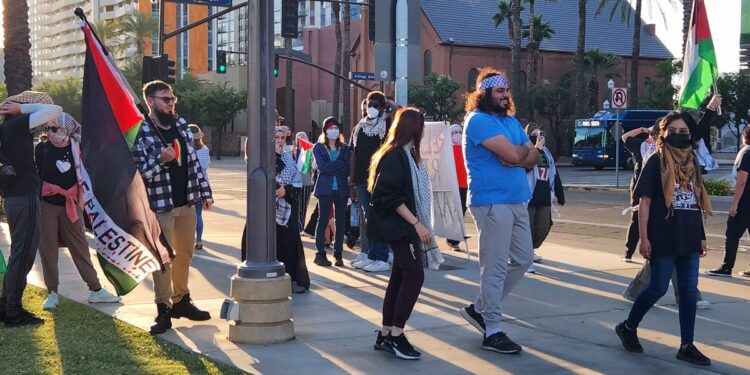Arrests, hijab removal during ASU pro-Palestinian protest denounced
Speakers at a news conference speak about arrests and hijab removal during a pro-Palestine protest at Arizona State University on May 2, 2024.
All three of Arizona’s public universities received free speech accolades this year after protests broke out at each campus this past spring.
The Foundation for Individual Rights and Expression, or FIRE, evaluates the state of free speech on college campuses across America to create a ranking. Arizona State University, the University of Arizona and Northern Arizona University all fell within the top 30 out of 251 schools measured.
All schools also received a “green light” in recognition of speech codes that protect students’ rights. Both ASU and UA saw improvements in their rankings this year. NAU fell slightly.
More than 900 students across the state’s universities were interviewed for the study, which used 14 criteria when creating a score. That score incorporates student perceptions and actions made by university administrators or professors.
The ratings come at a fraught time for many American universities, many of which saw large protests and demonstrations in support of Palestinians living in the midst of war in Gaza. At several campuses, including Arizona’s, students were arrested for trespassing after defying curfews.
ASU received “high honors” for how the school handled the 2022 visit of Mohammed el-Kurd, a Palestinian author and activist invited to campus by ASU’s chapter of Students for Justice in Palestine and the Palestine Cultural Club. The school chose to maintain el-Kurd’s invitation after ASU’s student government and other campus groups called for the event to be canceled.
“All individuals and groups on campus have the right to express their opinions, whatever those opinions may be, as long as they do not violate the student code of conduct, student organization policies, and do not infringe on another student’s individual rights,” a spokesperson said in a statement at the time.
ASU is also facing an ongoing free speech lawsuit arguing that multiple students’ First Amendment rights were violated when they were arrested and placed on interim suspension.
An ASU spokesperson said three students remain suspended while others have been allowed back to school.
David Chami, the lawyer representing those students, took issue with ASU’s recognition, saying he did not believe First Amendment rights were protected during the campus protests. He noted that two of the students were arrested within the first 20 minutes of the protest.Â
“I find it odd that there would have been no movement,” Chami said of the scores.
In an email to the Arizona Republic, Sean Stevens, FIRE chief research adviser, said the lawsuit against ASU was not factored into its score.
How did protests across America affect campus culture?
An administration’s response to the spring’s encampments was not directly included in its score, Stevens said. He said schools across the nation dealt with a mix of protected and unprotected speech and evaluating each individual case would not have been realistic.Â
As for schools that arrested students, Stevens said that did affect their scores.
“However, our analysis of the survey data before the encampments compared to afterwards indicates that schools where arrests occurred took a hit to their administrative support score, and in some cases saw increased rates of self-censorship and difficulty discussing controversial political views,” Stevens wrote in an email.
Self-censorship refers to when students select what they can and can’t say in fear of how their peers or professors will respond.Â
In addition, the group’s analysis of how schools were impacted nationwide showed that about a third of students polled by FIRE were disciplined or knew someone who was in the wake of spring protests. More than half of students said they felt “very” or “somewhat” uncomfortable talking about the war in Gaza with other students. The study found this was especially the case on campuses where encampments were built.
Students’ sense of safety has changed as well. According to the nationwide poll, about 28% of Jewish students said they feel “very” or “somewhat” unsafe on campus. About 48% of Muslim students said the police response to protests made them feel “very” or “somewhat” unsafe on campus.
Helen Rummel covers higher education for The Arizona Republic. Reach her at [email protected]. Follow her on X, formerly Twitter: @helenrummel.
Source link : http://www.bing.com/news/apiclick.aspx?ref=FexRss&aid=&tid=66e44a1a5577493c8a51df8eead4b670&url=https%3A%2F%2Fwww.azcentral.com%2Fstory%2Fnews%2Flocal%2Farizona-education%2F2024%2F09%2F13%2Farizona-colleges-commended-by-advocacy-group-for-free-speech-on-campus%2F74983758007%2F&c=9439419043760778378&mkt=en-us
Author :
Publish date : 2024-09-13 02:00:00
Copyright for syndicated content belongs to the linked Source.












